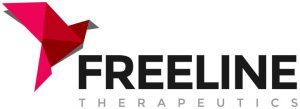UCLB News
Freeline Presents Data on AAV-based Gene Therapy for Haemophilia B at the 60th ASH Annual Meeting
4 December 2018

A single infusion of FLT180a resulted in sustained mean Factor IX activity of 45%, with no toxicity or adverse effects, and eliminated need for patient infusions of FIX replacements
Freeline, a clinical stage gene therapy company focused on providing life-changing curative treatments for chronic diseases, on December 3rd presented initial results from the ongoing B-AMAZE Phase 1/2 trial investigating FLT180a for Haemophilia B. After one infusion, the two patients dosed in the lowest dose cohort achieved mean FIX activity levels of 45%±5, which approaches the normal range of 50-150%.
The presentation was made by UCL Professor Amit Nathwani, Chief Scientific Officer of Freeline, Director of the Katharine Dormandy Haemophilia Centre at the Royal Free Hospital and a Senior NIHR Investigator. The study was sponsored by University College London.
Two patients with severe Haemophilia B received FLT180a at a single dose of 4.5 x 1011 vector genomes/kg body weight. Enrolment criteria included FIX activity levels <2% and no neutralising antibodies to AAVS3, the company’s proprietary high performing liver specific capsid, as measured by a transduction inhibition assay. Within 4 weeks of infusion, FIX activity in both participants rose to greater than 30%, and at 15 weeks stabilised at 45% ±5%. This level has now been sustained for six and nine months, respectively.
FLT180a was well-tolerated in these patients, with no infusion related reactions or late toxicities, no evidence of transaminitis and no evidence of neutralising anti-FIX antibodies. Following gene transfer, there were no spontaneous bleeding episodes and no need for FIX concentrate usage.
Professor Amit Nathwani, Founder and Chief Scientific Officer of Freeline and Professor of Haemophilia at UCL Cancer Institute said:
“Every day, I meet with patients whose lives are severely disrupted by Haemophilia B and who aspire to live free of the effects of this disease. These clinical results show that the Freeline technology has the potential to provide these patients normalisation of FIX activity levels.”
Anne Prener, Chief Executive Officer of Freeline, added:
“Freeline has been built on the ambition of providing patients a gene therapy with high protein expression. I am excited about the results, which support escalation to the next dose level with the goal of developing a functional cure for people with Haemophilia B. These data provide initial validation in humans of our proprietary capsid and manufacturing platform and support our plan to quickly progress our broad pipeline of programmes in a variety of diseases.”
Further information:
JW Communications
Julia Wilson
+44 (0) 781 8430877
Notes for Editors:
About Freeline
Freeline is a privately-held clinical-stage biotechnology company focused on AAV based gene therapy targeting the liver. Our vision is to create better lives for people suffering from chronic systemic diseases using the potential of gene therapy as a one-time curative treatment. Freeline is headquartered in the UK and has operations in Germany and the US.
Our next generation gene therapy builds upon the pioneering work that Freeline CSO and University College London Professor Amit Nathwani published in the New England Journal of Medicine in 2011 and 2014.
About Haemophilia B
Haemophilia B is an X-linked disease characterized by recurrent spontaneous and traumatic bleeds in all tissues, including the joints, muscles and central nervous system. Haemophilia B is caused by mutations of the F9 gene encoding for coagulation factor IX (FIX) which plays an essential role in normal blood coagulation. Manifestations of haemophilia can have lasting effects e.g., chronic arthropathy, life-threatening soft tissue bleeds, and CNS haemorrhages which can prove fatal. The life expectancy for Haemophilia B patients receiving treatment is 63-75 years dependent on severity of disease, and just 11 years for those without access to treatment.
Current treatment is aimed at preventing and treating bleeds through replacement of the missing blood coagulation factors given intravenously, when needed, from once every two weeks to twice weekly. Prophylactic coagulation factor can reduce arthropathy, bleeding episodes and other risks, but is a short-acting treatment requiring a life-long commitment. Even with treatment, FIX levels are unstable; the surges and deteriorations of FIX levels means breakthrough bleeds with their accompanying symptoms and risks can still occur during low FIX levels. Gene therapy treatment for Haemophilia B addresses the limitations of current treatment, offering potential for a one-time curative treatment.